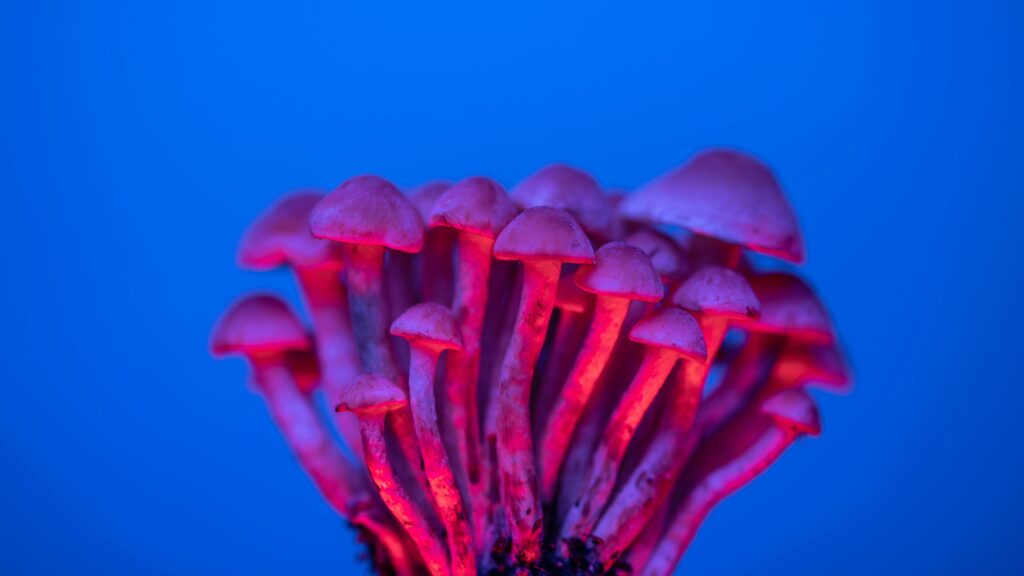By Alexis Konopny
February 16, 2024
Can microdosing psychedelics treat mental health disorders?
Microdosing psychedelics has been around for “many generations throughout history” and has stayed around because “there is something there for some people through psychedelic practice,” said Farb.

Mushrooms under blacklight. Photo by Marek Piwnicki and licensed through Pexels.
One night, Dr. Norman Farb’s graduate student, Thomas Anderson was scrolling on Reddit and came across a huge subreddit of over 10,000 people talking about microdosing psychedelics. He was shocked to see the amount of discussion from the experiences people had with microdosing psychedelics, to the improvements it had on their lives, to the reasons they were taking them and their importance to their life experiences. He then became curious as to what microdosing psychedelics was and why so many people were talking about it.
As explained in their 2019 article, Anderson and Farb along with their colleagues explained microdosing is when “very low, sub-hallucinogenic doses of psychedelic substances, such as psilocybin-containing mushrooms, are consumed.”
Microdosing psychedelics has been around for “many decades and generations throughout history” and has stayed around because “there is something there for some people through psychedelic practice,” said Farb.
Farb and his colleagues were interested in researching whether microdosing psychedelics is related to changes in people’s creativity, personality, and mental health. To explore this, they conducted a study in 2019 that involved recruiting participants from online psychedelic forums (such as Reddit) and asking them on the forums to report their experiences with microdosing psychedelics.
Seeing the subreddit on microdosing psychedelics grow “from 10,000 to 70,000 users indicated a growing interest over time.” Nonetheless, Farb and his team were surprised at the amount of feedback they had received from the survey.
After advertising the study, a huge interest was shown, and over 1000 participants took the time to self-report behaviours they experienced while microdosing. Participants were asked questions about whether they noticed any changes in their dysfunctional attitudes, wisdom, negative emotionality, open-mindedness, and mood while engaging in psychedelics.
After analyzing the results from the self-reported surveys, Farb and his team found that current and former microdosers reported lower scores on measurements of dysfunctional attitudes and negative emotionality, while also reporting higher levels of wisdom, open-mindedness, and creativity.
But not so fast. Does this mean that if you have dysfunctional attitudes, negative emotionally, or want higher wisdom, open-mindedness, or creativity, you should do psychedelics? No, it does not. It is important to note that this was a self-report study, and the main purpose was to show “the diversity of responses and experiences of individuals doing psychedelics” said Farb. Such responses could then guide a more focused clinical trial about the effects of microdosing on these domains.
After Farb published this self-report study, many investors and philanthropists came forward to ask how they can help fund further psychedelic research and had their own research questions. For example, one question was about the effects of microdosing psychedelics on mental health.
With the combination of investors and the great turnout of self-reports from the survey, Farb and his team were able to set up a controlled trial investigating microdosing psychedelics.
After over five years of preparation and working closely with Health Canada and the University of Toronto, Farb and his team were approved to run a trial that involved randomized participants that either received microdosing psychedelics or a placebo. The trial is currently running and Farb and his team hope to have at least 40 people so that they “can at least establish basic safety profiles and test for large effects.” Since it is expensive to run such clinical trials, Farb is only able to study a small sample of participants. Despite these limitations, he still believes it is important to run this trial “as there are very few other places in the world where microdosing research is conducted.”
Farb and his team are currently monitoring how participants respond in many different domains, including tests of mental abilities and creativity.
Farb believes “microdosing is really important as a vehicle for understanding psychedelics” and through larger clinical trials, he believes there is a potential to “see whether the chemical alone is enough to produce changes as opposed to the hallucinatory experiences people have on full doses of psychedelics.” This clinical trial is an advancement from Farb’s previous study involving self-reports and allows him and his team to “get more objective or third-person measures of the reported benefits and potential drawbacks of psychedelics.”
Farb also believes that this clinical trial on microdosing psychedelics is “breaking really important ground, whether or not it shows huge benefits of psychedelics compared to the placebo.”
In terms of results, Farb does not “expect to see massive benefits.” This is predicted because of the limitations to the study including small sample size. But these are predictions, and he says, “we will find out more in the new year and that is part of the fun.”
Although, for now, Farb believes “we are in the very early days of probably decades of research, and I think microdosing, in particular, is not going away anytime soon.” Even though Farb plans to “pivot back into working with meditation, raising awareness for self-reflection, and student mental health,” he still believes in the importance of microdosing psychedelics research and “thinks other labs that want to specialize in pharmacotherapy might benefit more from this type of research.”
Overall, through Farb’s research on psychedelics, he has learned that “even though it’s sometimes tiring or challenging to go through all sorts of processes as to whether it’s generally good for people or not, I think the jury is still out,” and he believes “we are going to find out in the next decade or so” about the impacts of psychedelics. So, for now, stay tuned.
Anderson, T., Petranker, R., Rosenbaum, D., Weissman, C. R., Dinh-Williams, L. A., Hui, K., Hapke, E., & Farb, N. A. S. (2019). Microdosing psychedelics: personality, mental health, and creativity differences in microdosers. Psychopharmacology, 236(2), 731–740.
